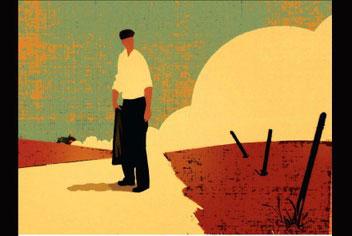Eighty years after John Steinbeck wrote the classic American novel The Grapes of Wrath, it remains a hardy perennial on many high school reading lists. But a casual survey of sixty-six upper-division English majors at the University of Texas in March of this year reveals that forty-nine students have not read the novel and that of the seventeen who have read it, twelve of them did not like it, with comments ranging from “meh” to “hated it.”
My own guess is that the novel ‘s length is a problem for some millennial attention spans and that its portrait of dirt-poor American “Okies” seems too remote from the bounty of American life in this century to hold the attention of today’s students.
Apart from these assumptions, I have my own problems with Steinbeck’s most celebrated work. I think the novel feels dated. One is the language of the characters. Though Steinbeck is capable of a kind of folk lyricism at times, at other times the characters speak in an unconvincing hick dialect. The second problem is an outgrowth of the speech; sometimes the language feels condescending. And there is a a good deal of backwoods sexual comedy that feels strained as well. The fact is, Steinbeck in this novel sometimes seems closer to Erskine Caldwell’s Tobacco Road than to, say, the people of the same class who inhabit William Faulkner’s As I Lay Dying.
The novel has a glorious history and that’s certainly worth remembering. Published in April, 1939, it was a runaway best seller with 430,000 copies in print by February, 1940. It won both a Pulitzer Prize and a National Book Award, but despite its sales and popularity, the novel sparked widespread condemnation. Newspapers in Oklahoma ran articles with titles like “Grapes of Wrath? Obscenity and Inaccuracy” and labeled the book a “morbid, filthily-worded novel.” Oklahomans were especially upset at misrepresentations of the state’s geography, and with good reason: Steinbeck did not visit Oklahoma during his research for the novel.
California was equally critical of the novel. The Associated Farmers of California denounced the book as a “pack of lies” and “Jewish propaganda.”A sizable number of citizens, both in Oklahoma and California, strongly objected to Steinbeck’s portrait of Okies suffering from exploitation by bankers and big land owners in their home state only to encounter even more repressive law-and-order policies in the Promised Land of California.
But the book’s popularity remained strong and was helped along by John Ford’s celebrated film of 1940starring Henry Fonda as Tom Joad. The film was a box-office hit and Ford won the Academy Award for Best Director and Jane Darwell the Best Supporting Actor Award for her portrayal of Ma Joad. Although it still has high ratings among some film critics, I don’t think it holds up well at all.
The novel’s standing gained much from academic criticism in the 1940s and 50s. Critics zeroed in on allegorical Christian elements, tracing the Christ-like arc of preacher Jim Cacy (i.e., JC), who helped along such interpretations with passages like: “I ain’t sayin’ I’m like Jesus…But I got tired like Him, an’ I got mixed up like Him, and I went into the wilderness like Him….” He also gets killed like Him. Following Casy’s death, Tom Joad, in a famous speech near the end of the novel, takes up the Christ-like mission: “Well, maybe like Casy says, a fella ain’t got a soul of his own, but on’y a piece of a big one…” and he continues, “I’ll be ever-where—wherever you look. Wherever they’s a fight so hungry people can eat, I’ll be there. Wherever they’s a cop beatin’ up a guy, I’ll be there.”
This kind of proletarian appropriation of messianic impulses has proved irresistible to latter-day Tom Joad wannabes such as Woodie Guthrie (“Tom Joad”) and Bruce Springsteen (“The Ghost of Tom Joad”).
Fortunately the contemporary reader today has the option of reading another novel about Okies written at the same time as The Grapes of Wrath—Sonora Babb’s Whose Names Are Unknown (2004). Babb, a native Oklahoman, in fact met Steinbeck in California and shared information with him about the lives of the people he was writing about. Her novel was turned down for publication in 1939 because Steinbeck’s was already making such a splash. In 2019 you can be the judge of which captures best that troubled time in the American West.
Don Graham holds the J. Frank Dobie Regents Professorship in American and English Literature at The University of Texas at Austin.
